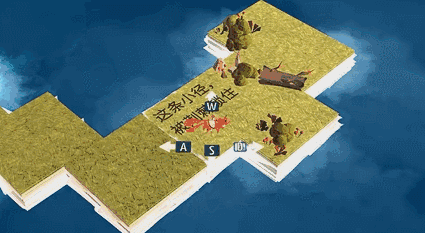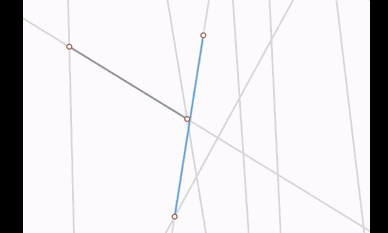In addition to "Traveling Frog", these posture games will also revolutionize your understanding of online games
There is such a game, there is no competition, no level, no task, only purely focused on "beauty and enjoyment" itself.
?
Don’t think you’re talking about the popular Traveling Frog these days – these comments are two feature games given by professional gamers to the domestic independent team Tag Design: "Mortise and Mortise" and "Folding Fan".
?
Unlike those games that emphasize competition, "Mortise and Mortise" and "Folding Fan" are popular science products with the theme of introducing traditional Chinese culture and craftsmanship. Players only need to swipe or click from start to finish, and the operation cannot be simpler. However, players can get a lot of satisfaction: "Mortise and Mortise" and "Folding Fan" provide detailed 3D models for each handicraft for users to watch and split 360 degrees; in simple swiping and clicking, players can learn all the structural characteristics, production process and related history of "Mortise and Mortise" and "Folding Fan"; in "Folding Fan", they can even participate in the 16 steps from choosing bamboo to making a fan.
?

"Mortise and tenon" game screen
?

"Folding Fan" game screen
?
That’s right, "Mortise and Mortise" and "Folding Fan" are both functional games, and they are online game types that have gradually emerged in China since this year. When many people regard online games as "monsters", functional games can often make people "treat each other differently" because they not only make people realize the value of "education and entertainment" again, but also make games play a role in cultural protection, technological innovation and other fields.
?
Functional games drive the transformation of the game industry
?
If traditional online games emphasize entertainment, then functional games refer to those categories of games whose main purpose is to solve real social and industrial problems. Therefore, if traditional entertainment games and functional games are divided, even if they do not emphasize competition, "Travel Frog" still belongs to the former, while "Mortise and Mortise" and "Folding Fan" belong to the latter.
?
Since the beginning of this year, the term "functional game" has begun to enter people’s field of vision, which is not unrelated to a message released by Tencent at the beginning of the year: Tencent announced that it will carry out a comprehensive layout of functional games from 2018, take functional games as one of the business Strategy and Development Direction, and plan to launch five categories of functional game products such as traditional culture, cutting-edge exploration, scientific exercise, scientific popularization, and parent-child interaction. Systematically explore and explore the positive social value of online games.
?
In fact, "functional games", which are still a new term in China, have been relatively mature in the international development. Functional games are playing an increasingly important role in different fields. In layman’s terms, functional games can become a new medium for people to receive knowledge and skills through entertaining and entertaining, opening up new perspectives for people in terms of shortening the learning curve, accelerating the dissemination of professional knowledge, innovating scientific research models, improving corporate productivity and solving social problems.
?
From the perspective of the international development of functional games, governments, enterprises and institutions in many developed countries and regions have regarded them as important skills training tools: the functional game "US Army" is used by the US Department of Defense for recruitment; "Emergency Commander" is used for drills for emergency disaster relief; "Code Orange" is used to train doctors to deal with mass casualty incidents; "Virtual Training Bank" provides financial analysis and risk management training for banks; functional game "Gabarello" for therapeutic purposes is used by Zurich Children’s Hospital for rehabilitation of brain injury patients….
?
Industry insiders believe that with the wide application of functional games, functional games are driving the transformation of the game industry. In the United States, functional games have been in the forefront of the world in various market segments such as corporate training and education since 1994. In the UK, functional games have become a professional discipline and entered institutions of higher learning. In Switzerland, about 30% of game designers are engaged in the field of functional game design.
?
Look, these are functional games.
?
Compared with the foreign functional game market, the development and promotion of functional games in China is in the ascendant. Many people don’t even know what a "functional game" is. In this regard, the relevant departments of Tencent listed several functional games for reporters to illustrate the rich connotation of functional games:
?
In terms of traditional culture and protection, the two functional games "Mortise and Mortise" and "Folding Fan" can make people more intuitively understand the subtlety of traditional skills; and in the function of "education and fun", the ingenious ideas of functional game developers are equally amazing.
?
For example, "Moana" developed by the Belgian team Fishing Cactus is an educational functional game that specializes in exercising users’ typing skills. Players will play a little girl riding a fox in the game and go on an adventure in a 2.5D origami world. In different level scenarios such as snow, mountains, forests, etc., players need to use the special method of "typing" to fight monsters and solve puzzles. "Moana" is based on spelling and includes 8 different languages including Chinese, English, and French. The spelling of characters in the game will also be redesigned according to the setting language. Whether you are a typist or a beginner, you can find fun in the game.
?

"Moana" game screen
?
Also, "Euclidean Geometry" developed by the Russian team Horis is a mathematical game that uses rulers to draw and solve geometric puzzles. In the game, players need to make vertical lines, tangents, angle bisectors, circles and other geometric shapes on the plane through the rational use of drawing tools, and complete the level challenge in rigorous geometric logic. At the same time, players can continuously optimize the design to get the most elegant and concise solution in as few steps as possible. Overall, players can not only appreciate the beauty of geometry in the game, but also improve their logical thinking ability. Therefore, whether students or players who have left school can feel the mystery of geometry in the game.
?

"European Geometry" game screen
?
Tencent also revealed that in their functional game development plan, including the cooperation of Lego, they will launch functional games related to Lego building blocks through complementary advantages, so that more people, including parents and children, can learn while playing. Such games can not only educate and entertain, but also facilitate parent-child interaction.
?
Functional games are a big industry
?
In fact, the reason why functional games have developed rapidly in the international market is not unrelated to the economic value they contain. Tencent Research Institute has compiled statistics on more than 130 functional games and found that the combination of education and games is the most extensive, accounting for about 43% of the total, of which more than half of functional game products are used in primary and secondary education; about 19% of functional games are used in enterprises and business; medical functional games are ranked third, accounting for more than 16%. Among them, children’s medical games are the main ones, with content ranging from knowledge popularization to disease treatment. In addition to the above three fields, functional games are also widely used in different fields such as military, culture, and social management, involving all aspects of social life.
?
The "cross-border" collection of games and different industries has generated huge economic value. Some institutions predict that games with cross-border applications will develop at a compound annual growth rate of 16.38% between 2015 and 2020, and the market size will reach 5.45 billion US dollars. In contrast, the development and application of functional games in our country is still in its infancy and needs to be vigorously developed.
?
It is worth noting that the development of functional games is not only the task or interest of game companies. In recent years, the cross-border development of some enterprises has also further revealed the value of functional games. For example, IBM, Johnson & Johnson, Cisco and other companies have launched their own functional games, not only using them to train employees, but also combining games with their main business. For example, IBM has widely used games in internal businesses such as sales and Customer relationship operations, business information and data analytics; at the same time, in 2010, it first launched the cross-border game "CityOne" (literal translation: a city), which was designed, developed and produced by itself, to find urban planning solutions through role-playing. In addition, IBM has also integrated various new technologies developed by itself, such as process management, cloud computing, and collaboration, into the game, allowing players to learn how to use new technologies to help cities become smarter. After the launch of "CityOne", more than 8,000 people participated in the pre-registration process.
?
Industry insiders therefore propose that the development of functional games is worthy of "admiration" from the outside world for the value of online games. For a long time, the domestic game industry has been burdened with huge social pressure, and traditional entertainment games have been controversial. But these views should not affect the development of functional games. In this context, it is necessary to improve the motivation and enthusiasm of industry and academia to develop functional games at the policy level, develop high-quality content, and then drive the whole society to gradually raise awareness of functional games and gradually accept their application in all walks of life.